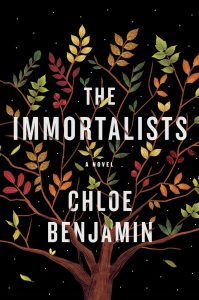Chloe Benjamin’s first novel, The Anatomy of Dreams, received the Edna Ferber Fiction Book Award. She received her MFA in fiction form the University of Wisconsin. Her fiction, poetry and essays have been widely published.
The Immortalists is a tale of family love, prophesy, destiny and magic. Among other questions, it asks, If you knew the date of your death, how would you live your life? In 1969, a travelling psychic arrives in the Gold family’s neighborhood; she claims to be able to tell anyone the day on which he or she will die; she tells each of four Gold children when they will die. Though the siblings keep the dates secret from one another, their prophesies affect each of them profoundly. Following each sibling, the novel is a tale about life, mortality and the choices we make.
Knowing when we’re going to die is a unique premise for a novel. What made you decide to use it in ‘The Immortalists’?
I’ve always wanted to have a great fortune-teller experience in my own life.
It’s fair to say the premise of the book derives from my own neuroses and anxieties.
The uncertainty of life itself and our lack of control over much that awaits us, have gnawed at me for years. These preoccupations came together in this novel in the form of three children who encountered a fortune-teller, and each one’s story slowly unfolds.
One sibling in ‘The Immortalists,’ Klara, becomes a magician, while another, Varya, becomes a biologist focused on the quest to prolong life. Will you talk about these different approaches to cope with the uncertainties we face in life?
That’s a great question. I think much of my own quest in life is to figure out how best to cope with my own uncertainties. In the book, I wanted to look at different frameworks or philosophies to deal with the unknown—either through science or religion. Klara has faith, not so much in religion, but in magic or mystery inherent to life in the world. On the other hand, Varya’s interest in science is her attempt to find an evidenced-based, practical and realistic truth. She thinks and believes that life can be extended, and death can be outsmarted. I wanted to explore those approaches and how they each offered a different perspective and challenge to the uncertainties in life.
Both Klara and Varya must deal with mental turmoil. Will you talk about your own life in relation to these fictional characters?
The characters weren’t explicitly pulled from my life, but there are pieces of me in each of them. Although I wish I was Klara—with faith in magic—I think I’m actually closer to Varya. I don’t have her degree of anxiety or fixation on control, but there’s a good deal of me in her. So, the writing I did in her section is the most personal and raw. I don’t think I expected that to happen when I began writing the book. I myself struggle with anxiety, so through these characters, I was able to explore where that comes from and tried to see a way out of it.
So then, to some degree, for you, writing involves putting some of your own demons on the page?
Yes, it does. I wish I could say writing this book did away with some of my doubts about the unknown, but it didn’t. [Laughter]. If anything, it crystallized my uncertainties. I now understand them with more clarity, and know more about their origins. I hope the novel offers solace to people struggling with the same issues.
One might say ‘The Immortalists’ is not so much a book about dying as it is about living life. Will you talk about that?
I thought about that as I was writing the book.
You can’t have bad things happening to characters simply for shock value; you need to provide context. Wth each of the characters, I portrayed how they lived; what they thought about their lives; and how each ultimately dealt with death.
Who are your literary influences?
My favorite writer is Alice Munro. It’s simply amazing how well she captures entire lifetimes in a single short story. I’m often shocked and delighted as I read the next sentence in one of her stories. Lorrie Moore, Flannery O’Connor, Raymond Carver, and Mary Gaitskill also influenced me profoundly. Phillip Pullman’s books are gorgeously written and explore questions of consciousness, so he’s influenced me, as has Donna Tarte.
If you could meet two fictional characters in real life, who would they be?
The characters who leap to mind are Dumbledore and Snape from the Harry Potter books. Following them and their complexities over so many books has always stayed with me.
What’s coming next from Chloe Benjamin?
I’m going on an eighteen day, sixteen city book tour for The Immortalists. I’m excited about the chance to meet readers. I’m also working on the next book, but I’m too caught up with it to say anything about it right now.
Congratulations on penning ‘The Immortalists,’ a family saga about love, destiny, living life and making choices that will cause readers to consider what to do with the time given them on this earth.





Leave a Reply
You must be logged in to post a comment.